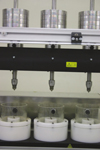Abstract
Purpose
The purpose of this study is to compare the removal torque between prefabricated and customized implant abutment screw.
Materials and methods
Three types of implant system (Osstem, Astra, Zimmer) were used. For each system, prefabricated abutment screw (control group) and customized abutment screw (test group) were used to connect the fixture and the abutment (n = 6). Digital torque gauze was used to control the tightening torque and the screws were tightened under each manufacturer's recommendation. 10 minutes after the connection the same tightening torque was applied, and 5 minutes after the second connection, the removal torque was measured. This procedure was repeated 10 times. In the cyclic loading test, 10 minutes after the first connection to the 6 groups (n = 3), the same tightening torque was applied, and a total of 1,000,000 time loading was applied at 30 degree angle to long axis with 50 N load. Repeated measures of ANOVA test (α=.05) was used as statistics to evaluate the effect of repeated loading number on the removal torque. Independent t-test was used to evaluate the difference in removal torque after cyclic loading.
Results
The removal torque significantly decreased as the number of loading repetition increased (P<.05). In the 10 time repetition test, there was no significant difference between the prefabricated and customized implant abutment screw of the 3 implant system (P<.05). Also in the cyclic loading test, there was no significant difference between the prefabricated and customized implant abutment screw of the 3 implant system (P<.05).
Figures and Tables
 | Fig. 2Representative of the control and experimental group. For the Prefabricated (left) and customized (right) Titanium screws (A, B, C). |
References
1. Eckert ES. Text book of Oral & Maxillofacial Implantology. 2006. 2nd ed. Korea: Daehan Narae Publishing Inc,;304.
2. McGlumphy EA, Mendel DA, Holloway JA. Implant screw mechanics. Dent Clin North Am. 1998. 42:71–89.

3. Carlson B, Carlsson GE. Prosthodontic complications in osseointegrated dental implant treatment. Int J Oral Maxillofac Implants. 1994. 9:90–94.

4. Jemt T. Failures and complications in 391 consecutively inserted fixed prostheses supported by Brånemark implants in edentulous jaws: a study of treatment from the time of prosthesis placement to the first annual checkup. Int J Oral Maxillofac Implants. 1991. 6:270–276.
5. Jung RE, Pjetursson BE, Glauser R, Zembic A, Zwahlen M, Lang NP. A systematic review of the 5-year survival and complication rates of implant-supported single crowns. Clin Oral Implants Res. 2008. 19:119–130.

6. Laney WR, Jemt T, Harris D, Henry PJ, Krogh PH, Polizzi G, Zarb GA, Herrmann I. Osseointegrated implants for single-tooth replacement: progress report from a multicenter prospective study after 3 years. Int J Oral Maxillofac Implants. 1994. 9:49–54.
7. Henry PJ, Laney WR, Jemt T, Harris D, Krogh PH, Polizzi G, Zarb GA, Herrmann I. Osseointegrated implants for single-tooth replacement: a prospective 5-year multicenter study. Int J Oral Maxillofac Implants. 1996. 11:450–455.
8. Priest G. Single-tooth implants and their role in preserving remaining teeth: a 10-year survival study. Int J Oral Maxillofac Implants. 1999. 14:181–188.
9. Bickford JH. An introduction to the design and behavior of bolted joint Marcel Dekker. 1995. New York: Raven Press;894.
10. Im SM, Kim DG, Park CJ, Cha MS, Cho LR. Biomechanical considerations for the screw of implant prosthesis: A literature review. J Korean Acad Prosthodont. 2010. 48:61–68.

11. Haack JE, Sakaguchi RL, Sun T, Coffey JP. Elongation and preload stress in dental implant abutment screws. Int J Oral Maxillofac Implants. 1995. 10:529–536.
12. Zembic A, Sailer I, Jung RE, Hämmerle CH. Randomized-controlled clinical trial of customized zirconia and titanium implant abutments for single-tooth implants in canine and posterior regions: 3-year results. Clin Oral Implants Res. 2009. 20:802–808.

13. Choi JH, Yang JH, Cho WP, Lee JB. The influence of abutment screw length and repeated tightening on screw loosening in dental implant. J Korean Acad Prosthodont. 2006. 44:432–442.
14. Hong YS, Park EJ, Kim SJ, Kim MR, Heo SJ, Park JM. Customized abutment and screw-type implant prostheses after cementation based on the digital intra-oral impression technique. J Korean Acad Prosthodont. 2012. 50:67–73.

15. Lee TS, Han JS, Yang JH, Lee JB, Kim SH. An influence of abutment materials on a screw-loosening after cyclic loading. J Korean Acad Prosthodont. 2007. 45:240–249.
16. Siamos G, Winkler S, Boberick KG. Relationship between implant preload and screw loosening on implant-supported prostheses. J Oral Implantol. 2002. 28:67–73.

17. Graf H. Bruxism. Dent Clin North Am. 1969. 13:659–665.
18. Gibbs CH, Mahan PE, Mauderli A, Lundeen HC, Walsh EK. Limits of human bite strength. J Prosthet Dent. 1986. 56:226–229.

19. Shigley JE, Mischke CR. Standard Handbook of Machine Designs. 1986. New York: McGraw-Hill;369.




 PDF
PDF ePub
ePub Citation
Citation Print
Print












 XML Download
XML Download